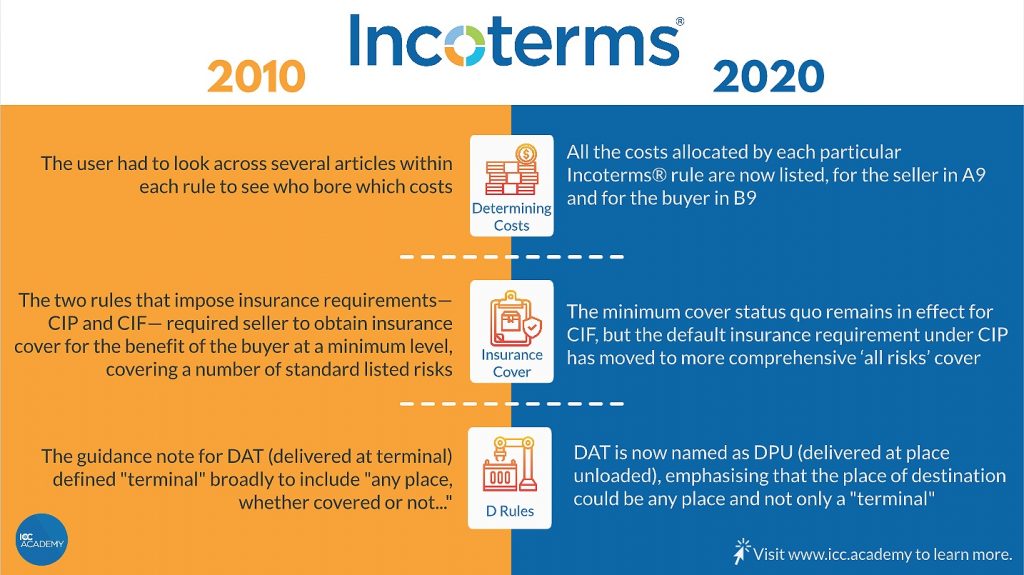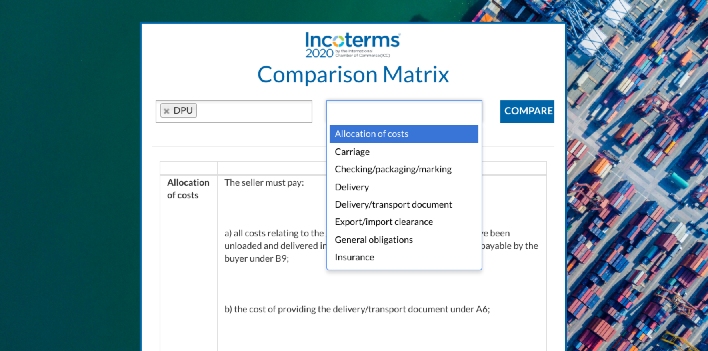The International Chamber of Commerce (ICC) reviews and updates the Incoterms® rules every ten years – the previous edition was published in 2010. It responds to concerns raised by users of Incoterms and to changes in the market to ensure the terms are relevant and suitable to both domestic and global trade.
The changes made in this latest edition – the ICC’s Incoterms® 2020 – address, amongst other things, increased security requirements, improved clarity on cost allocation as well as tackling insurance concerns.
A common question from trade professionals is whether contracts referring to previous versions of Incoterms® rules are valid. The answer is simple: each contract is governed by the version of Incoterms® rules that was referred to in that contract. If the contract referred only to Incoterms® rules but not to a specific year, then the Incoterms® rules version in force at that time of contracting would most likely be applied in the event of a dispute. Best practice is always to refer to the most recent revision, e.g. Incoterms® 2020.
So what are the main changes in Incoterms® 2020 vs 2010?

Further Learning: Although we have covered the main changes to the Incoterms® 2020 above and in more detail below, there is no substitute for thoroughly learning or re-learning the rules to avoid potentially costly mistakes. The best place to start is our Incoterms® 2020 Certificate, the only online course on the new rules that is fully endorsed by the ICC. Our course was written and reviewed by members of the ICC Incoterms® 2020 Drafting Group – make sure you learn from an authentic, legitimate source.
-
Bills of lading:
FOB (free on board) should not normally be used for container shipments. This is because a seller usually loses control of the container once the container arrives at the port of export before the container is loaded. However, FOB means the seller takes all the risk and cost of the export, port terminal handling charges and loading costs/risks. Sellers should then use FCA (Free Carrier).
However, many sellers still use FOB because the letter of credit from the bank often requires an onboard bill of lading for the seller to get paid. As under FOB the seller is responsible for loading, they have a higher chance of getting an onboard bill of lading.
Therefore, to try and help people to use FCA, FCA has changed to allow the buyer and seller to agree that the seller will get an onboard bill of lading.
-
Insurance under CIF (carriage insurance and freight) and CIP (carriage and insurance paid to):
The Incoterms® rule, CIP means that the seller is only responsible for delivery of the goods to the carrier but pays for the carriage and insurance of the goods to the named destination. CIF is the same, except that it can only be used for maritime transport (delivery is onto a ship and the destination needs to be a port).
In Incoterms® 2020, CIF keeps the same insurance requirements as in Incoterms® 2010, but CIP has increased the level of insurance required to be obtained by the seller. This is due to the fact that CIF is more often used with bulk commodity trades, and CIP is more often used for manufactured goods, and manufactured goods tend to require a higher level of insurance.
Although CIF and CIP require the seller to obtain insurance, it is recommended that parties consider whether additional insurance coverage is required to reflect the potential risk of damage to the goods during transport.
If you use CIF or CIP, you need to review to see if that is still the correct approach.
-
DAT (delivered at terminal) has changed to DPU (delivered at place unloaded):
In Incoterms® 2010, DAT means the goods are delivered once unloaded at the named terminal. As DAT limits the place of delivery to a terminal, in Incoterms® 2020, the reference to terminal has been removed to make it more general. DPU means delivered at place unloaded (which can now be used for all modes of transportation). There is no other change.
If you use DAT Incoterms® 2010, then change over to DPU Incoterms® 2020.
-
Security Requirements:
In recent years, transport security requirements have become more prevalent in international trade, and Incoterms® 2020 reflects such a change by detailing security requirements for each Incoterms® rule. For example, CPT (carriage paid to) includes a specific requirement that the seller must comply with any security-related requirements for transport to the destination. These security requirements bring cost and risk delay if not fulfilled by the parties.
Are there any other changes I should be aware of?
Apart from specific changes to the rules themselves, the ICC has also added a brand–new matrix comparison tool (available as part of the ICC Academy’s Incoterms® 2020 Certificate) that makes it easier and faster than ever to find the right rule for your transaction – even if you are not an expert.

Emily O’Connor, Director of Trade and Investment for the International Chamber of Commerce (ICC), said “you can look at it horizontally or vertically, and quickly check yourself that you are choosing the right rule. That will be an extremely useful tool – people can focus on the issues that they really care about.”
She continued “One thing important in each rule is who pays for what. We’ve made that information easier to find, picked out all the little costs that arise in various articles in each rule and put them all in one place”.
The matrix tool is one of a number of changes and initiatives designed to make the rules more user friendly, and O’Connor believes that if there is to be a legacy of this edition of the Incoterms® rules, it is to help users avoid mistakes, especially those that are not experts or lawyers.
Further Learning:
During the drafting process for the Incoterms® 2020, the ICC discovered that even experienced users of the rules were often choosing the wrong rule for their transaction.
Further Learning: Although we have covered the main changes to the Incoterms® 2020 above and in more detail below, there is no substitute for thoroughly learning or re-learning the rules to avoid potentially costly mistakes. The best place to start is our Incoterms® 2020 Certificate, the only online course on the new rules that is fully endorsed by the ICC. Our course was written and reviewed by members of the ICC Incoterms® 2020 Drafting Group – make sure you learn from an authentic, legitimate source.
About the author
Some of the content for this post was originally written by David Lowe, Partner and Head of International Commerce at Gowling WLG. David is an experienced partner focusing on commercial contracts.
He helps clients negotiate and draft contracts to achieve their commercial aims in areas such as supply chain, logistics, supply of goods and services, international trade and consumer law.
The rest of the content is taken from ICC Academy’s own courses.

